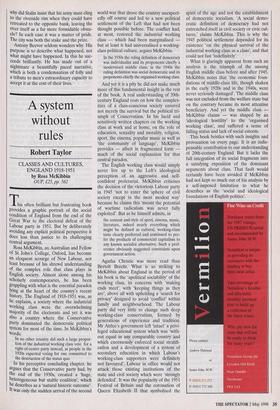A system without rules
Robert Taylor
CLASSES AND CULTURES, ENGLAND 1918-1951 by Ross McKibbin OUP, £25, pp. 562 This often brilliant but frustrating book provides a graphic portrait of the social condition of England from the end of the Great War to the electoral defeat of the Labour party in 1951. But by deliberately avoiding any explicit political perspective it does less than justice to its challenging central argument.
Ross McKibbin, an Australian and Fellow of St John's College, Oxford, has become an eloquent scourge of New Labour, not least because of his shrewd understanding of the complex role that class plays in English society. Almost alone among his scholarly contemporaries, he has been grappling with what is the essential paradox lYing at the heart of the country's recent history. The England of 1918-1951 was, as he explains, a society where the industrial working class were the overwhelming majority of the electorate and yet it was also a country where the Conservative party dominated the democratic political system for most of the time. In McKibbin's Words:
In no other country did such a large propor- tion of the industrial working class vote for a right-of-centre party instead, as people in the 1920s expected voting for one committed to the destruction of the status quo.
In his perceptive concluding chapter, he argues that the Conservative party had, by the end of the 1930s, created a 'huge, heterogeneous but stable coalition', which he describes as a 'natural historic outcome'. It was only the sudden arrival of the second world war that drove the country unexpect- edly off course and led to a new political settlement of the Left that had not been thought possible before. The conflict had, at most, restored the industrial working class — which had been marginalised but at least it had universalised a working- class political culture, argues McKibbin.
In the 1930s the ruling definition of democracy was individualist and its proponents chiefly a modernised middle class; in the 1940s the ruling definition was social democratic and its proponents chiefly the organised working class.
And yet it is a pity he did not make much more of this fundamental insight in the rest of the book. A real understanding of 20th- century England rests on how the complex- ities of a class-conscious society ensured not merely the survival but the political tri- umph of Conservatism. In his lucid and sensitively written chapters on the working class at work and at home, on the role of education, sexuality and morality, religion, sport, the cinema, popular music as well as `the community of language', McKibbin provides — albeit in fragmented form much of the social explanation for that central paradox.
The English working class would simply never live up to the Left's ideological perception of an aggressive and self- confident proletariat. McKibbin criticises the decision of the victorious Labour party in 1945 'not to enter the sphere of civil society except in the most modest way' because he claims this 'meant the potential of wartime radicalism was never fully exploited'. But as he himself admits, in
the content and style of sport, cinema, music, literature, indeed nearly everything which might be defined as cultural, working-class taste clearly preferred and continued to pre- fer the products of commercial capitalism to any known socialist alternative. Such a pref- erence obviously suggested constraints upon government action.
Agatha Christie was more read than Bertolt Brecht. What is so striking to McKibbin about England in the period of his book is the 'apolitical sociability' of the working class, its concerns with 'making ends meet', with 'keeping things as they are', above all with upholding a 'search for privacy' designed to avoid 'conflict' within family and neighbourhood. The Labour party did very little to change such deep working-class conservatism, formed by generations of experience and tradition. Mr Attlee's government left 'intact' a privi- leged educational system which was 'with- out equal in any comparable country and which enormously enforced social stratifi- cation and a development of a system of secondary education in which Labour's working-class supporters were definitely not favoured'. Labour in office would not attack those existing institutions of the state and civil society which were 'strongly defended'. It was the popularity of the 1951 Festival of Britain and the coronation of Queen Elizabeth II that symbolised the spirit of the age and not the establishment of democratic socialism. 'A social demo- cratic definition of democracy had not entrenched itself in civil society or civic cul- tures,' claims McKibbin. This is why the 1945 political settlement depended for its existence 'on the physical survival of the industrial working class as a class', and that could not last 'indefinitely'.
What is glaringly apparent from such an analysis is the triumph of the unsung English middle class before and after 1945. McKibbin notes that 'the economic foun- dations of middle-class life, though shaken in the early 1920s and in the 1940s, were never seriously damaged'. The middle class was not excluded from the welfare state but on the contrary became its most attentive beneficiary. And yet the middle class McKibbin claims — was shaped by an `ideological hostility' to the 'organised working class', and suffered a sense of falling status and lack of social esteem.
This book bristles with such insights and provocation on every page. It is an indis- pensable contribution to our understanding of 20th-century England. But it lacks the full integration of its social fragments into a satisfying exposition of the dominant arguments about class. That fault would certainly have been avoided if McKibbin had not kept so much out of his analysis by a self-imposed limitation to what he describes as the 'social and ideological foundations of English politics'.


























































 Previous page
Previous page